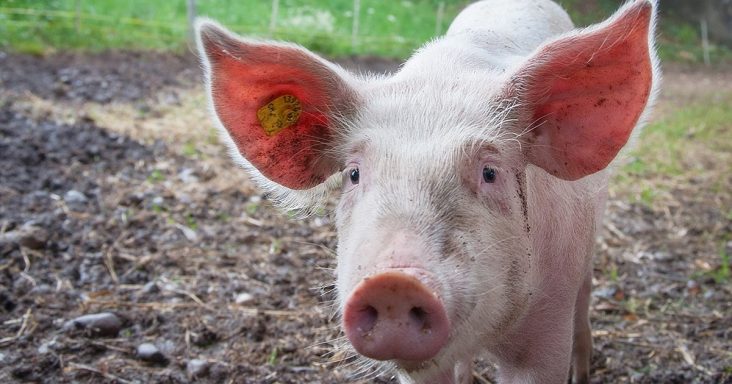Tyson CEO sees opportunity amid African Swine Flu epidemic
by May 15, 2019 1:32 pm 756 views

African Swine Flu (ASF) has already killed more hogs in China than the U.S. will produce this year, according to Tyson Foods CEO Noel White. Speaking at the BMO Capital Markets Farm to Fork conference on Wednesday (May 15), White said ASF is an unprecedented event and effects from the epidemic will linger for several years because China produces half of all the pork in the world.
White said it’s not just the pork market impacted. He said other proteins like chicken, beef and fish will have to fill the gap created by up to 30% of Chinese pork production being lost.
Pork in cold storage in China will buy time but as that supply dwindles this summer, prices are likely to move higher as the gap in supply widens, he said. He said prices have started to firm up in recent weeks in response to the ASF impact.
ASF is a highly contagious disease that is usually fatal for swine. There are no vaccine or treatment options available for the disease that has spread from China to Taiwan, Vietnam and Cambodia. White said the industry estimates ASF will take between 150 million and 200 million hogs out of the market this year.
Christine McCracken, an industry analyst with Rabobank, said the virus can last for long periods in uncooked pork and can survive weeks in feces and roughly a month in hog pens and trailers where infected hogs are transported. She agreed with White that it will likely take years for the Chinese swine economy to fully recover.
The overall impact on global protein supply is expected to be a reduction of 5% to 7%, or roughly 10 million metric tons this year, according to Rabobank.
IMPACT TO CHICKEN
White said Tyson Foods is in a good position to benefit given it controls its supply of chicken and has ample access to cattle to grow its beef business, and soon, alternative protein sources of its own to help fill the gap from reduced pork supply. He said demand for protein has never been higher and production has been relatively flat which also bodes well for pricing power this year and next.
Tyson Foods is also poised to benefit from lower soybean prices from excess supplies on the market. China will also need fewer soybeans which will likely cause supplies to rise higher. Paul Aho, an economist with Poultry Perspective, said lower grain costs and higher meat prices equal fatter margins for protein companies for the foreseeable future.
Aho said that scenario favors U.S. companies even if they do not end up exporting chicken to China. He said new poultry plants coming online in the U.S. were once believed to be ill-timed and creating oversupply, but now it seems the time is right to take advantage of the coming protein gap.
Stephens Inc. analyst Ben Bienvenue said ASF will likely cause pork prices to rise faster than chicken or beef, but for companies like Tyson who play in multiple proteins and even pure chicken plays like Sanderson Farms there will be more pricing power in the coming months just as seasonal demand also rises. He said this has already started to be factored into their rising stock prices.
TRADE WITH CHINA
The U.S. poultry industry has basically been shut out of China. While the U.S. poultry industry could benefit from a trade deal with China to allow chicken exports, White said it will be hard for China to increase its own chicken supply because they lack breeders and infrastructure necessary to do it quickly. China does not allow breeding stock for the U.S.
The USA Poultry & Egg Export Council has said as meat supply in China becomes more desperate he expects China will be more encouraged to look to the U.S. to help fulfill the demand.
White told analysts Wednesday there is also a 62% tariff on U.S. pork exports to China and while there is some product being shipped it’s in no way a meaningful amount.
“The interest is substantial from customers in China. They want it and they are waiting to see how trade negotiations go. The fact that we won’t ship directly into China is not a big hurdle for us. China will get product from somewhere and they will create a shortage somewhere else and an opportunity for us,” White said.
BRIGHT SIDE
White also talked about other opportunities to grow sales at Tyson Foods and continue the strategy to stabilize earnings with higher overall margins from sectors like the prepaid foods business which has grown from a $1 billion asset five years ago to roughly $10 billion today. He said the acquisition of Hillshire Farms was a catalyst for that growth but other acquisitions and continued execution have margins pushing 11%. compared to being only marginally profitable in 2014.
He said the company’s exit from Beyond Meat was strategic because it wanted to grow that segment internally and found it in conflict to continue as an investor in a competitor. White said products coming this summer have the potential to be a billion-dollar brand and Tyson has used its resources to enter the category with a big splash.
Shares of Tyson Foods (NYSE: TSN) traded higher Wednesday amid the broader market rebound. The stock was selling for $82.47, up 90 cents on normal volume in the morning session. For the past 52 weeks the share price has ranged from $49.77 to $82.39. Year-to-date Tyson shares have been on a bull run up 35%.
